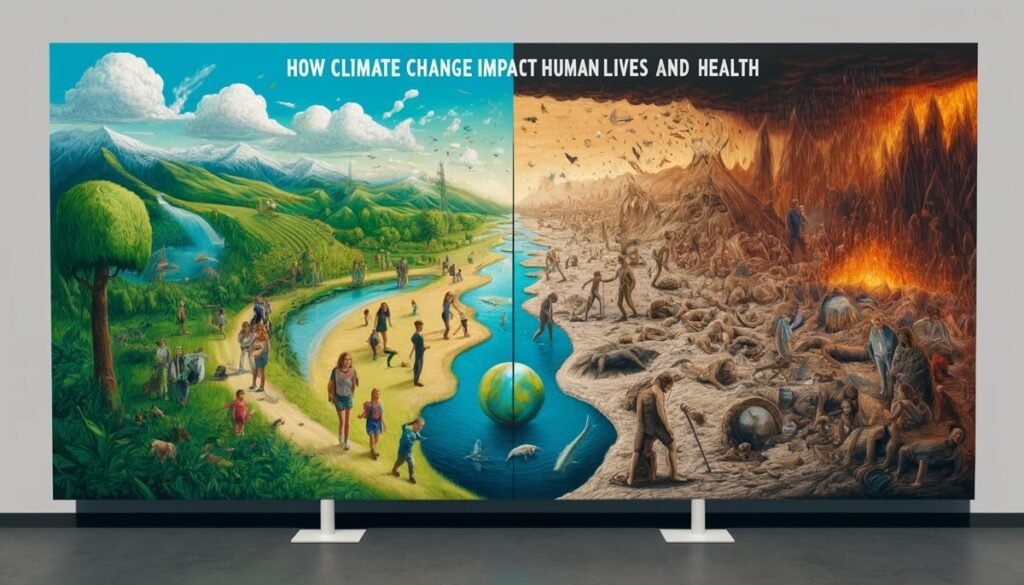
Climate change is not just an environmental issue – it’s a profound public health crisis. As the planet warms, humanity faces not only environmental destruction but also a slew of health challenges. This article explores the myriad ways in which climate change is impacting human lives and health, delving into the direct and indirect effects that are reshaping the landscape of global health.
Contents
Direct Health Impacts of Climate Change
- Increased Heat-related Illnesses
- Overview: Rising global temperatures lead to more frequent, intense heatwaves, which can cause heat exhaustion, heatstroke, and dehydration. These conditions are particularly dangerous for the elderly, children, and those with pre-existing health conditions.
- Greater Vector-borne Disease Spread
- Overview: Warmer climates expand the habitats of vectors like mosquitoes and ticks. This shift increases the range and season of diseases like malaria, dengue fever, Lyme disease, and Zika virus.
- Respiratory Problems
- Overview: Increased air pollution from wildfires and higher pollen counts due to prolonged growing seasons exacerbate respiratory conditions like asthma and allergic rhinitis.
Indirect Health Impacts of Climate Change
- Food Security and Nutrition
- Overview: Climate change affects crop yields and disrupts food production, leading to increased risks of malnutrition and undernutrition, especially in vulnerable populations in developing countries.
- Mental Health Issues
- Overview: The psychological impact of climate change is profound. Natural disasters, displacement, and the loss of property and livelihoods can lead to mental health crises, including depression, anxiety, and post-traumatic stress disorder (PTSD).
- Water-Related Health Risks
- Overview: Changes in rainfall patterns and water scarcity affect the availability and quality of drinking water. This can lead to a higher incidence of water-borne diseases such as cholera and giardiasis.
Adaptive Strategies and Global Response
- Strengthening Public Health Systems: Enhancing the resilience of healthcare facilities and public health frameworks to withstand climate impacts.
- Community Education and Preparedness: Educating communities about the health risks of climate change and promoting adaptive behaviors such as installing air conditioning, using mosquito nets, and consuming safe water.
- Policy and Advocacy: Implementing policies that reduce carbon emissions and promote renewable energy, sustainable agriculture, and water conservation to mitigate the root causes of climate change.
Conclusion
The health implications of climate change are complex and far-reaching, affecting every aspect of human life. It is crucial for global leaders, policymakers, and individuals to recognize these health risks and work collaboratively towards sustainable solutions. By addressing climate change proactively, we can safeguard our planet and our health for future generations.
FAQs about Climate Change and Health
Q: How does climate change affect children differently than adults?
A: Children are particularly vulnerable to the effects of climate change due to their developing bodies and immune systems, which make them more susceptible to disease and environmental toxins.
Q: Can improving air quality help mitigate some health effects of climate change?
A: Yes, improving air quality can significantly reduce health issues related to pollution and allergens, which are exacerbated by climate change.
Q: What can individuals do to protect themselves from the health impacts of climate change?
A: Individuals can stay informed about local climate risks, participate in community preparedness programs, and support policies that aim to reduce carbon emissions.
Q: Are there any benefits to climate change for human health?
A: While the overall impacts are overwhelmingly negative, some regions may experience milder winters which could reduce seasonal mortality rates. However, these benefits are far outweighed by the risks.